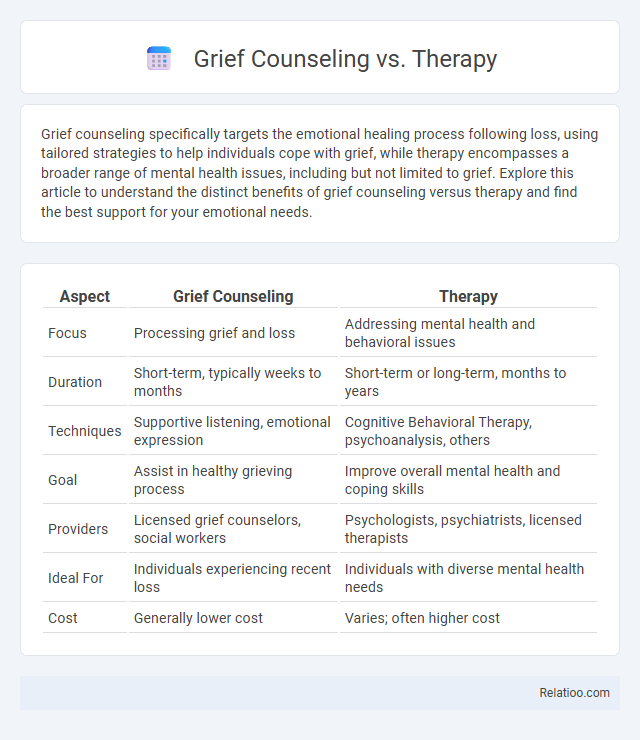Grief counseling specifically targets the emotional healing process following loss, using tailored strategies to help individuals cope with grief, while therapy encompasses a broader range of mental health issues, including but not limited to grief. Explore this article to understand the distinct benefits of grief counseling versus therapy and find the best support for your emotional needs.
Table of Comparison
| Aspect | Grief Counseling | Therapy |
|---|---|---|
| Focus | Processing grief and loss | Addressing mental health and behavioral issues |
| Duration | Short-term, typically weeks to months | Short-term or long-term, months to years |
| Techniques | Supportive listening, emotional expression | Cognitive Behavioral Therapy, psychoanalysis, others |
| Goal | Assist in healthy grieving process | Improve overall mental health and coping skills |
| Providers | Licensed grief counselors, social workers | Psychologists, psychiatrists, licensed therapists |
| Ideal For | Individuals experiencing recent loss | Individuals with diverse mental health needs |
| Cost | Generally lower cost | Varies; often higher cost |
Understanding Grief: Definitions and Key Concepts
Grief counseling focuses on providing support and coping strategies specifically tailored to manage the emotional pain of loss, while therapy encompasses a broader range of psychological treatments addressing underlying mental health issues beyond grief. Grief involves a natural response to loss that includes emotional, cognitive, and behavioral reactions, with key concepts such as denial, anger, bargaining, depression, and acceptance forming the stages of the grieving process. Understanding the distinctions between grief, grief counseling, and therapy is crucial for selecting appropriate interventions that promote healing and emotional resilience.
What Is Grief Counseling?
Grief counseling is a specialized form of support designed to help individuals navigate the emotional challenges following a loss, focusing on coping strategies and emotional healing. Unlike general therapy, grief counseling specifically addresses the stages of grief and assists you in processing feelings such as sadness, anger, and confusion tied to bereavement. Trained grief counselors provide a safe environment for exploring your unique experience of grief while promoting resilience and adjustment to life changes.
What Is Therapy for Grief?
Therapy for grief focuses on helping you process and cope with the emotional pain of loss through structured sessions with a licensed mental health professional. Unlike grief counseling, which tends to be shorter and more supportive, therapy often involves deeper exploration of underlying issues and long-term healing strategies. Your therapist may use cognitive-behavioral techniques, narrative therapy, or EMDR to address complex grief symptoms and promote emotional resilience.
Key Differences: Grief Counseling vs Therapy
Grief counseling specifically targets emotional support and coping strategies for individuals experiencing loss, relying on short-term, focused sessions to address immediate feelings of grief. Therapy encompasses a broader range of mental health treatment, including long-term psychological interventions that explore deeper underlying issues beyond grief, such as depression or anxiety. The key difference lies in grief counseling's specialized, time-limited approach versus therapy's comprehensive, ongoing process tailored to overall mental health.
When to Choose Grief Counseling
Grief counseling is best suited for individuals experiencing specific loss-related emotions who need targeted support to process their grief effectively. Therapy, on the other hand, addresses broader mental health concerns and long-term emotional issues extending beyond grief alone. You should choose grief counseling when your primary challenge is coping with the loss and navigating the immediate emotional impact rather than dealing with underlying psychological disorders.
When to Seek Therapy for Grief
Seek therapy for grief when prolonged feelings of sadness, anxiety, or depression interfere with daily functioning for more than six months, indicating complicated grief. Grief counseling typically suits those needing support processing loss in the short term, focusing on emotional expression and coping strategies. Therapy for grief involves deeper psychological intervention to address underlying mental health issues like PTSD, prolonged grief disorder, or unresolved trauma linked to bereavement.
Common Techniques in Grief Counseling
Grief counseling commonly employs techniques such as cognitive-behavioral therapy (CBT) to help individuals identify and reframe negative thoughts related to loss, as well as narrative therapy to encourage expressing and making sense of personal grief stories. Therapists also use mindfulness and relaxation strategies to manage symptoms of anxiety and depression that often accompany grief. Unlike general therapy, grief counseling specifically targets the emotional, psychological, and social challenges of bereavement through specialized approaches like meaning reconstruction and grief mapping.
Therapeutic Approaches for Grief
Therapeutic approaches for grief encompass grief counseling and therapy, each tailored to support emotional healing after loss. Grief counseling typically involves short-term guidance using techniques like cognitive-behavioral therapy (CBT) and narrative therapy to help individuals process emotions and develop coping strategies. In contrast, grief therapy may offer longer-term, in-depth psychological treatment addressing complicated grief through modalities such as psychodynamic therapy or prolonged exposure therapy.
Benefits and Limitations: Counseling vs Therapy
Grief counseling provides targeted emotional support and coping strategies focused specifically on processing loss, offering short-term relief and practical guidance for navigating bereavement. Therapy, in contrast, addresses broader mental health issues and underlying psychological patterns, enabling deeper healing over a longer period but often requiring greater time commitment. Counseling's limitation lies in its narrower scope and shorter duration, while therapy may be less accessible due to cost and intensity despite its comprehensive benefits.
Choosing the Right Support for Grief Healing
Choosing the right support for grief healing involves understanding the distinctions between grief counseling, therapy, and general grief support. Grief counseling typically offers short-term, focused assistance on coping with specific losses, while grief therapy delves deeper into emotional challenges and underlying mental health issues over a longer duration. Selecting grief support depends on individual needs, with counseling suited for immediate coping strategies and therapy recommended for complex grief reactions or co-occurring psychological conditions.

Infographic: Grief Counseling vs Therapy
 relatioo.com
relatioo.com